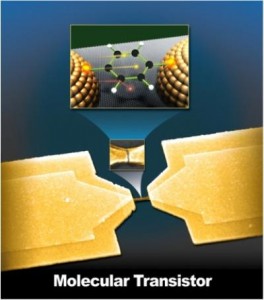Scientists create world's first molecular transistor

Scientists from Yale University and the Gwangju Institute of Science and Technology in South Korea, have succeeded in creating the first transistor made from a single molecule.
The team showed that a benzene molecule attached to gold contacts could behave just like a silicon transistor. The researchers adjusted the voltage, allowing them to raise and lower the molecule’s energy states and demonstrated that it could be used exactly like a traditional transistor at the molecular level. The team published their findings in Nature.
"It's like rolling a ball up and over a hill, where the ball represents electrical current and the height of the hill represents the molecule's different energy states," said Mark Reed, the Harold Hodgkinson Professor of Engineering & Applied Science at Yale. "We were able to adjust the height of the hill, allowing current to get through when it was low, and stopping the current when it was high." The result is similar functionality to regular transistors, but with a molecule a few atoms in size.
The work builds on previous research Reed did in the 1990s, which demonstrated that individual molecules could be trapped between electrical contacts.
While the new transistor is a scientific breakthrough, Reed conceded that practical applications such as smaller and faster "molecular computers"—if possible at all—are many decades away.
"We're not about to create the next generation of integrated circuits," he said. "But after many years of work gearing up to this, we have fulfilled a decade-long quest and shown that molecules can act as transistors."
Remarkable yes. But is it the ultimate in electronic device miniaturization? Earlier this month, an international team from Finland and Australia reported the development of a single-atom transistor.
In recent years, engineers have been moving away from silicon to exotic materials such as graphene to slash transistor size, with 10 atoms the record last year. The molecular transistor reduces that figure down to the single digits, possibly just one nanometer in length.
